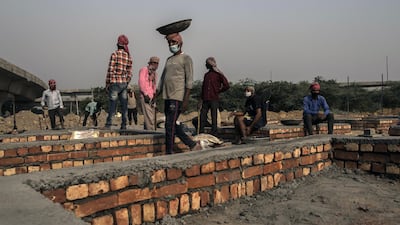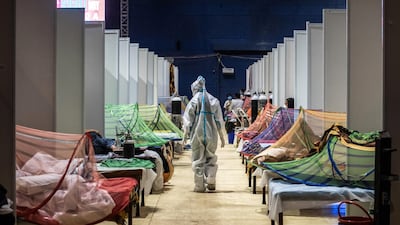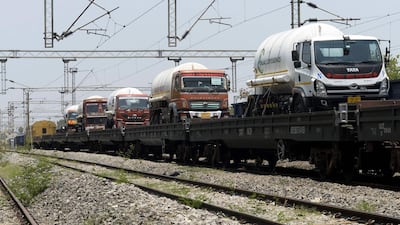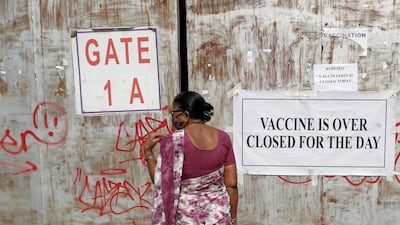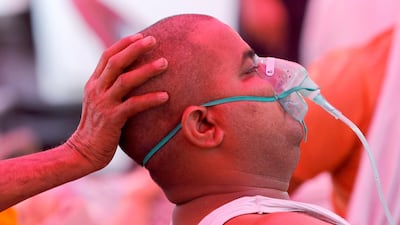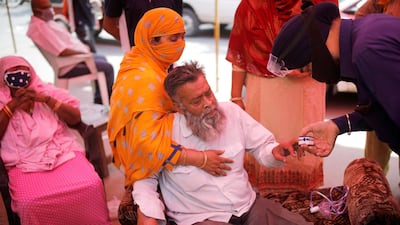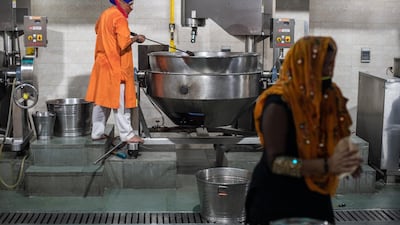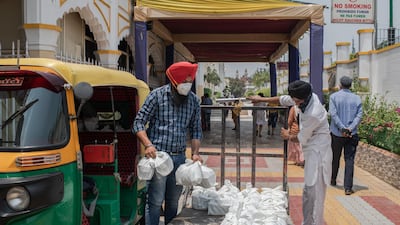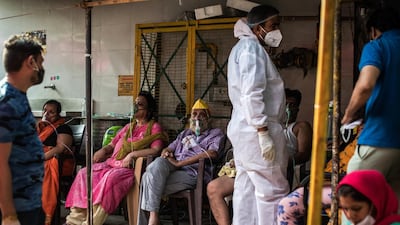Related: Quarantine in Dubai and Abu Dhabi - what you need to know when arriving from abroad
UAE residents stranded in India rushed to book tickets to return to Dubai after authorities in the emirate said flights from the country would resume on June 23.
Only passengers with a valid residence visa, and who have received two doses of a UAE-approved vaccine are allowed to travel to the emirate from India.
Residents said they were willing to pay three times the regular fare and sit through "institutional quarantine" until they receive the result of the PCR test they must take on arrival in Dubai.
The UAE suspended incoming flights for most travellers from India on April 25, leaving thousands stranded as cases of Covid-19 soared in south Asia.
Despite this, Vishal Porwal, a 37-year-old Indian resident of Dubai, travelled home to Kanpur, in the northern state of Uttar Pradesh, in May for his wedding.
The area was hit by the second wave of the pandemic, and the account manager at Emirates NBD had to stay in India for a month-and-a-half, the longest he has lived at home in a decade.
He now hopes to travel back to Dubai with his wife Neha Porwal on June 25.
"I was not expecting that this news of flights being resumed would come soon," Mr Porwal said.
"This was an excellent surprise. There is a rush for booking tickets and prices are high at the moment as there are many UAE residents stuck here."
Mr Porwal said he needed to resume work in person at the bank, and while he normally pays around Dh400 for a one-way ticket from Delhi to Dubai, on this occasion he spent Dh1,200 for a flydubai flight.
"There is no choice, and I will have to pay. Work is very important in these challenging times," he said.
"I can work from home but it's not the most viable option as I have to meet clients."
He said the bank supported employees who were stranded abroad.
Although he and his wife could only have a small celebration, Mr Porwal said he was glad the ceremony went ahead.
"I had spent months planning my wedding and did not want to postpone the date," he said.

"We could just have a few family members, only 20 of us, at the wedding.
"We feel blessed that in the situation, we could get married."
Mr Porwal took both doses of the Sinopharm vaccine before travelling to India, and his wife has taken the Covishield vaccine, which is the Oxford AstraZeneca inoculation manufactured by the Serum Institute of India.
Roundabout routes no longer necessary
Other UAE residents stranded in India have been forced to take roundabout routes back to the Emirates.
Mr Porwal said some of his friends had travelled to Tashkent in Uzbekistan and would stay there for two weeks before going to Dubai.
Another Dubai resident, Rohit D'Souza, also considered this option after becoming stranded in India for two months with his wife and children.
Now, he plans to fly back directly as soon as possible.
"I already had a ticket which I will reschedule. I will call Emirates to check the availability and price. As of yesterday when I called Emirates did not have clarity," Mr D'Souza said.
"I was extremely worried about when I would be able to return to Dubai.
"Initially, I came to Delhi as I was planning to fly via Tashkent, but this news came last night, and now I am waiting here to book my flights to the UAE."
Mr D'Souza travelled to Belgaum in the southern Indian state of Karnataka in April to help his parents and parents-in-law, who were unwell.
He did not expect to be stranded for two months. His children, who are enrolled at schools in Dubai, were able to continue their studies online and will return with his wife in July.
Unvaccinated still face a struggle to return
Other UAE residents stranded in India said they were worried that months will pass before they can return to the Emirates.
Gilbert Dsouza, 60, and his wife Cynthia, 55, travelled from Sharjah to Mangalore in southern India to prepare for their daughter's wedding on April 24, a day before the UAE suspended incoming flights from India.
They have not been vaccinated and contracted coronavirus in late April. The couple had a mild infection and recovered quickly, but now have to wait for three months before they can be inoculated.
Greyar Dsouza, their son, said he was worried about vaccine shortages in India and also about running the family car workshops in Sharjah on his own.
“We are hoping they get any vaccine in India just so they can get back,” he said.
“We are in a mess with the business because my father has never been away for more than five to six days, and it has been more than two months now.”
Greyar was also in India for the wedding but was among hundreds of residents who took long routes to the UAE, after incoming flights were halted to stem the spread of the coronavirus.
He spent his two-week quarantine in the Maldives in May. Others travelled through Armenia, or spent thousands of dirhams on chartering private jets to return to their jobs and families in the Emirates.
“My travel back was a bit of a circus because we were not exactly sure what would happen, and if I could be able to return,” Greyar said.
As a family, they considered it safer for him to travel than his parents.
“I needed to come back to handle the business and didn’t want them to take the risk of quarantine in another country to get back here,” he said.










